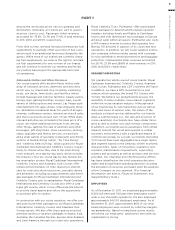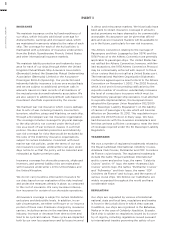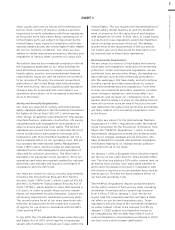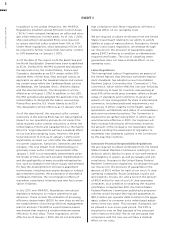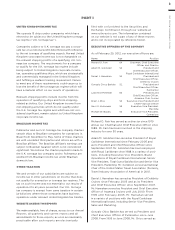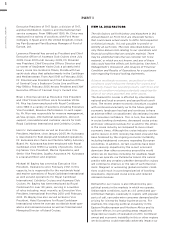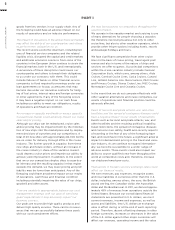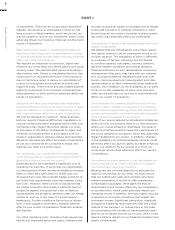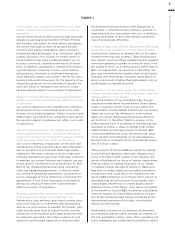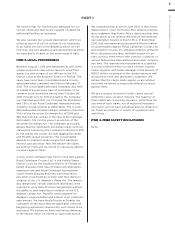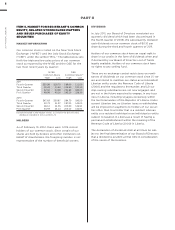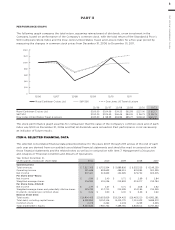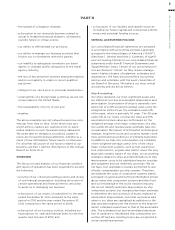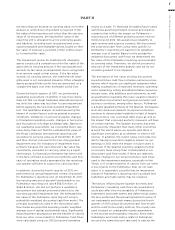Royal Caribbean Cruise Lines 2011 Annual Report Download - page 35
Download and view the complete annual report
Please find page 35 of the 2011 Royal Caribbean Cruise Lines annual report below. You can navigate through the pages in the report by either clicking on the pages listed below, or by using the keyword search tool below to find specific information within the annual report.
PART I
ROYAL CARIBBEAN CRUISES LTD. 31
of balance sheet items denominated in foreign curren-
cies. We use derivative financial instruments to miti-
gate our net exposure to currency exchange rate
fluctuations. However, there can be no assurances
that fluctuations in foreign currency exchange rates,
particularly the strengthening of the U.S. dollar against
major currencies, would not materially affect our
financial results.
In addition, we have ship construction contracts which
are denominated in euros. While we have entered into
euro-denominated forward contracts to manage a
portion of the currency risk associated with these ship
construction contracts, we are exposed to fluctua-
tions in the euro exchange rate for the portion of the
ship construction contracts that has not been hedged.
Additionally, if the shipyard is unable to perform under
the related ship construction contract, any foreign
currency hedges that were entered into to manage the
currency risk would need to be terminated. Termina tion
of these contracts could result in a significant loss.
Environmental, labor, health and safety, financial
responsibility and other maritime regulations could
affect operations and increase operating costs.
The United States and various state and foreign
government or regulatory agencies have enacted
or are considering new environmental regulations
or policies, such as requiring the use of low sulfur
fuels, increasing fuel efficiency requirements, further
restricting emissions, or other initiatives to limit green-
house gas emissions that could increase our cost for
fuel, cause us to incur significant expenses to purchase
and/or develop new equipment and adversely impact
the cruise vacation industry. See “Item 1. Business—
Regulation—Environmental Regulations.” An increase
in fuel prices not only impacts our fuel costs, but
also some of our other expenses, such as crew travel,
freight and commodity prices. Although not all initia-
tives are likely to be implemented, it is apparent that
some future legislation and regulations related to the
environment will impact the cruise industry and could
adversely impact our costs. Some environmental
groups have also lobbied for more stringent regulation
of cruise ships and have generated negative publicity
about the cruise vacation industry and its environ-
mental impact.
With regards to labor, we anticipate that the new
standards set forth in the Maritime Labour Convention
when ratified and effective (which we currently believe
may occur in 2012 and 2013, respectively) will likely
result in increased costs associated with our onboard
employees. See “Item 1. Business—Regulation—Labor
Regulations.” While we have been actively seeking
ways to mitigate the potential impact on our business,
there can be no assurances that our efforts will be
successful or that our financial results of operations
will not be materially impacted.
In addition, we are subject to various international,
national, state and local laws, regulations and treaties
that govern, among other things, safety standards
applicable to our ships, treatment of disabled per-
sons, health and sanitary standards applicable to our
guests, security standards onboard our ships and at
the ship/port interface areas, and financial responsi-
bilities to our guests. These issues are, and we believe
will continue to be, an area of focus by the relevant
authorities throughout the world, especially in light
of the recent grounding of the Costa Concordia.
This could result in the enactment of more stringent
regulation of cruise ships that would subject us to
increasing compliance costs in the future.
Conducting business globally may result in increased
costs and other risks.
We operate our business globally and plan to continue
to develop our international presence. Operating
internationally exposes us to a number of risks, includ-
ing unstable local economic conditions, volatile local
political conditions, potential increases in duties and
taxes, required compliance with additional laws and
policies affecting cruising, vacation or maritime busi-
nesses or governing the operations of foreign-based
companies, currency fluctuations, interest rate move-
ments, difficulties in operating under local business
environments, U.S. and global anti-bribery laws or
regulations, imposition of trade barriers and restrictions
on repatriation of earnings. In addition, if a country
where we have significant operations or obligations
leaves the euro currency system, our financial condi-
tion may be adversely impacted. If we are unable to
address these risks adequately, our financial position
and results of operations could be adversely affected,
including potentially impairing the value of our ships,
goodwill and other assets.
Operating globally also exposes us to numerous and
sometimes conflicting legal and regulatory require-
ments. In many parts of the world, including countries
in which we operate, practices in the local business
communities might not conform to international busi-
ness standards. We may not be successful in ensuring
that our employees and other representatives stationed
throughout the world properly adhere to our policies
or applicable laws or regulations. Failure to adhere to
our policies or applicable laws or regulations could
result in penalties, sanctions, damage to our reputa-
tion and related costs which in turn could negatively
affect our results of operations and cash flow.
Our attempts to expand our business into new markets
may not be successful.
While our historical focus has been to serve the North
American cruise market, we have expanded our focus
to increase our international guest sourcing, most
recently, in the Brazilian, Asian and Australian markets.
Expansion into new markets requires significant levels


